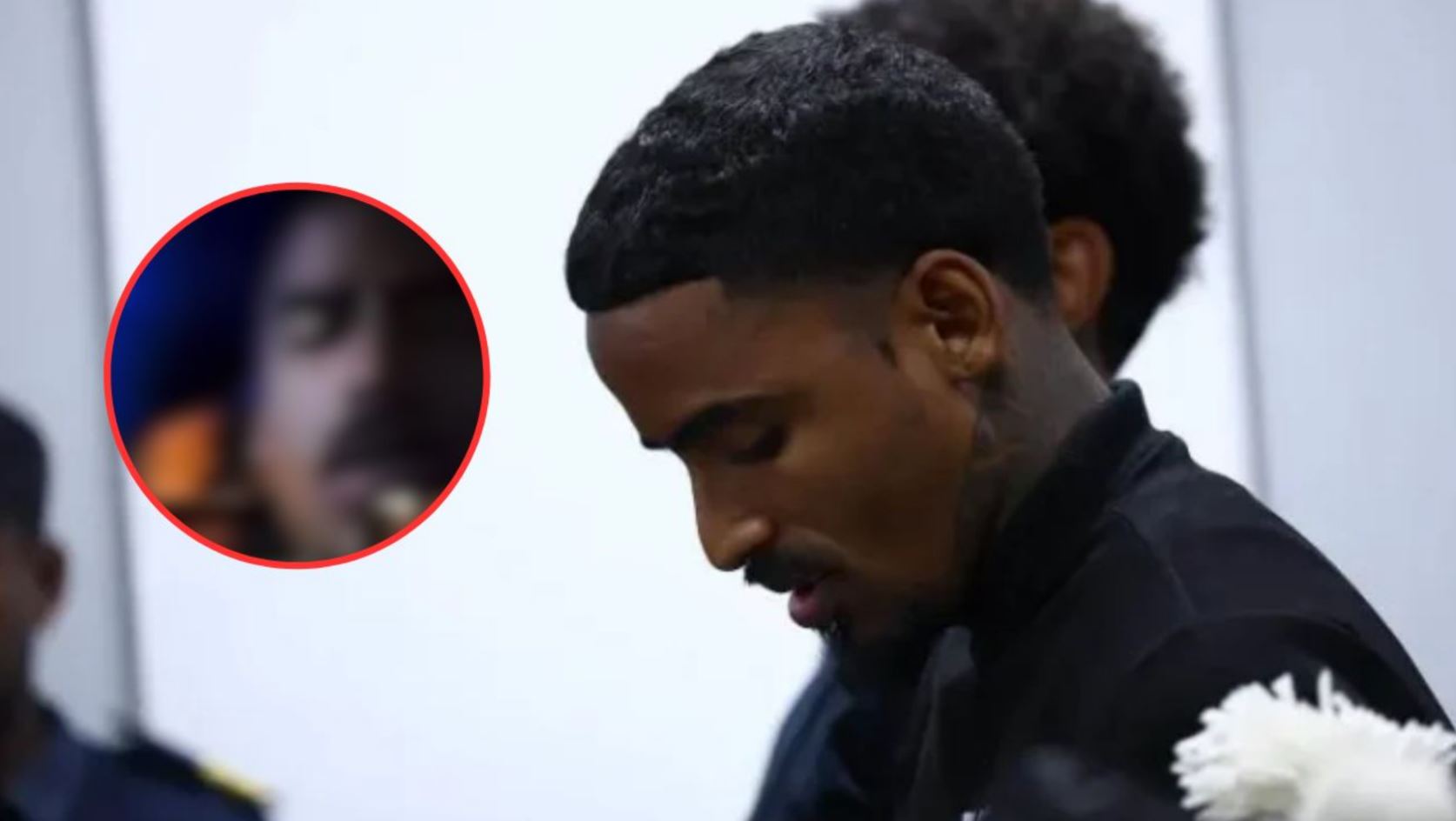Chiquito Video Viral Inside the Controversial Leak
The “Chiquito Video Viral” has captivated public attention, sparking widespread discussion across multiple social media platforms. This incident revolves around a leaked video of Alison de Jesús Pérez Mejía, commonly known by his alias, Chiquito. Originating from within the walls of La Victoria jail in Santo Domingo, Dominican Republic, the footage quickly escalated into a viral sensation, especially prominent on Twitter and Telegram.
Alison de Jesús Pérez Mejía, a 27-year-old inmate at the time, was captured in a video that displayed him engaging in what appears to be a private, compromising interaction through a cellphone. Such a device is strictly prohibited within the penal system, raising immediate concerns regarding security breaches and the monitoring of communication devices within correctional facilities. The video’s content, identified as ‘sexting’, involves sending and receiving sexually explicit messages or images, a practice mostly prevalent among tech-savvy youths according to the GCF Global portal. However, the occurrence of such activities inside a highly regulated environment like a prison adds layers of complexity and illicitness to the event.
The immediate fallout from the video’s exposure has led to a flurry of online debates and discussions about the conditions inside Dominican prisons, the rights and violations of inmates, and the broader implications for privacy and digital security. The fact that Chiquito managed to access and use a cellphone while incarcerated not only highlights significant lapses in prison security but also underscores the challenges of controlling digital communication technology in a penal setting.
This incident sheds light on Chiquito’s background and the circumstances leading to his incarceration. Before this controversy, Chiquito was already serving a sentence for a grave crime committed against Joshua Omar Fernández, carried out in a violent encounter outside a bar in the Naco sector, where Chiquito and his associates targeted young individuals leaving the venue. His involvement in this crime and the subsequent leak from the prison paints a complex picture of justice and misconduct intertwined with issues of technological intrusion.
| Aspect | Details |
|---|---|
| Event | Chiquito Video Viral |
| Individual | Alison de Jesús Pérez Mejía (alias Chiquito) |
| Location | La Victoria jail, Santo Domingo, Dominican Republic |
| Nature of the Video | Sexting via cellphone; compromising interaction captured on video |
| Social Media Impact | Viral on Twitter and Telegram |
| Legal and Security Issue | Use of a prohibited device in prison, highlighting security breaches and communication monitoring issues within correctional facilities |
| Public Reaction | Online debates about prison conditions, inmate rights, privacy, and digital security |
| Background of Chiquito | Serving a sentence for a grave crime against Joshua Omar Fernández; violent encounter outside a bar in Naco |
| Implications | Highlights lapses in prison security, challenges in controlling digital communication in prisons, intertwining issues of justice, misconduct, and technological intrusion |
Contents
Background on Alison de Jesús Pérez Mejía
Alison de Jesús Pérez Mejía, better known by his alias “Chiquito,” has become a figure of notoriety and controversy. Originally from the Dominican Republic, Chiquito’s life took a dramatic turn following his involvement in a criminal incident that would define his subsequent years. His criminal activities culminated in a serious offense against Joshua Omar Fernández. This crime occurred in the parking lot of a local bar in the Naco sector, a bustling nightlife hub. During what was described as a robbery, Chiquito fired on young people leaving the bar, resulting in the tragic death of Fernández. The gravity of this act led to his arrest and conviction.

Following his conviction, Chiquito was sentenced to 30 years in prison, marking the beginning of a long and potentially transformative period of his life. He was initially incarcerated at La Victoria jail, a notorious facility in San Domingo known for its harsh conditions and overcrowded cells. However, his stay there would not last, as concerns over security and perhaps the need for better rehabilitation facilities prompted a transfer. He was moved to the Rehabilitation Center (CCR-20) Najayo-Men in San Cristóbal, a facility designed to provide a more structured environment for the rehabilitation of offenders.
| Aspect | Details |
|---|---|
| Alias | Chiquito |
| Origin | Dominican Republic |
| Notable Crime | Serious offense against Joshua Omar Fernández in a robbery incident, involving shooting at young people leaving a bar in the Naco sector |
| Outcome of the Crime | Resulted in the death of Fernández; led to Chiquito’s arrest and conviction |
| Sentence | 30 years in prison |
| Initial Incarceration | La Victoria jail, Santo Domingo – known for harsh conditions and overcrowding |
| Subsequent Transfer | Moved to the Rehabilitation Center (CCR-20) Najayo-Men in San Cristóbal, aimed at providing a structured environment for the rehabilitation of offenders |
Details of the Leaked Video on Instagram
The incident that reignited public interest in Chiquito was a leaked video that surfaced on social media platforms such as Twitter and Telegram. The video displayed Chiquito in what can only be described as a compromising and controversial situation. In the footage, he is seen engaging in ‘sexting’ through a cellphone—an act of sending and receiving sexually explicit messages or images. The fact that Chiquito could even access a cellphone while incarcerated raised immediate red flags considering such devices are strictly prohibited in prisons.
‘Sexting’ itself, while a common practice among the wider, tech-savvy youth demographic, is fraught with legal and ethical issues when it occurs within the confines of a prison. The content of the video, which involves personal and intimate exchanges, highlights the challenges and complexities of maintaining security and enforcing regulations within correctional facilities. It brings to the forefront the ongoing issues of contraband control and the integrity of prison security systems.

The legality and implications of possessing a cellphone in prison are severe. For inmates, unauthorized access to mobile phones can lead to additional charges and extended sentences. For the prison administration, it is a glaring indication of a breach in security protocols. Cellphones in prisons can lead to a host of illicit activities, including the coordination of crimes outside prison walls, the intimidation of witnesses, and further breaches of privacy.
Video by Chiquito on Instagram for your reference:
Xem bài viết này trên Instagram
This incident not only casts a spotlight on Chiquito’s personal misdemeanors but also raises broader questions about the efficacy of the Dominican penal system. How Chiquito acquired the phone is a question that remains unanswered, but its implications are being debated by law enforcement agencies, prison authorities, and the public alike. The event underscores a critical need for stringent security measures and comprehensive rehabilitation programs that address not just the penal aspect but also the technological educations of inmates to prevent such incidents in the future.
In conclusion, the life of Alison de Jesús Pérez Mejía, his criminal endeavors, and the subsequent viral video scandal serve as a stark reminder of the multifaceted challenges faced by the criminal justice system in the digital age. These events highlight the intersection of crime, punishment, rehabilitation, and technology—all of which continue to shape the discourse on prison reform and inmate rehabilitation in the Dominican Republic and beyond.
| Aspect | Details |
|---|---|
| Incident | Leaked video showing Chiquito engaging in sexting via a cellphone while incarcerated. |
| Public Platforms Involved | Twitter and Telegram; video became viral, prompting widespread discussion. |
| Legality and Prison Policy | Cellphones are prohibited in prisons; their presence indicates significant security breaches. |
| Risks and Consequences | Unauthorized cellphone use by inmates can extend sentences, aid in coordinating crimes outside of prison, intimidate witnesses, and breach privacy. |
| Broader Implications | Highlights issues with contraband control, security integrity in prisons, and the need for stringent security measures. |
| Discussion Points | Debates about the effectiveness of the Dominican penal system, questions about how Chiquito accessed the phone, and discussions on reforming prison security and policies. |
| Technological Education | Suggests a need for comprehensive rehabilitation programs that include education on technology to prevent similar incidents. |
Impact and Reactions
The leak of the video featuring Alison de Jesús Pérez Mejía, alias Chiquito, engaged in sexting from within a Dominican Republic prison, ignited a fervent reaction across social media platforms. Users on Twitter and Telegram shared the footage widely, sparking a robust discussion about the conditions within Dominican prisons and the rights and regulations surrounding incarcerated individuals. The public’s response was a mix of outrage, concern, and disbelief that such a security lapse could occur, reflecting deep-seated issues within the penal system.
This incident highlighted significant implications for prison security and privacy issues. Firstly, the ease with which the video was recorded and leaked points to a severe oversight in prison management and control over contraband. Cellphones, as contraband, pose a unique threat within penal institutions, not only enabling unauthorized communication and potential criminal activities but also compromising the privacy and safety of inmates and staff. This situation thus calls for a thorough investigation into security protocols and the integrity of enforcement in Dominican correctional facilities.
| Aspect | Details |
|---|---|
| Public Platforms | The video was widely shared and discussed on social media platforms like Twitter and Telegram. |
| Public Reaction | Mixed reactions including outrage, concern, and disbelief, highlighting worries about the conditions within Dominican prisons. |
| Security Lapses | The incident underscores significant security lapses, particularly in managing contraband like cellphones. |
| Privacy Concerns | The ease of recording and leaking the video raises concerns about the privacy and safety of inmates and staff within the facilities. |
| Call to Action | There is a strong call for a thorough investigation into security protocols and the integrity of their enforcement. |
| Broader Implications | The event highlights the need for reform in how prisons manage security, contraband, and the rights of incarcerated individuals. |
Current Status and Legal Consequences
Following the scandal, Chiquito was relocated to the Rehabilitation Center (CCR-20) Najayo-Men in San Cristóbal. This center is known for its focus on rehabilitating offenders through structured programs, suggesting a shift towards addressing the underlying issues leading to inmates’ criminal behavior. Reports from inside the facility indicate that Chiquito is now under stricter surveillance, with authorities possibly tightening security measures to prevent a recurrence of such incidents.

The legal repercussions for Chiquito following the video leak are severe. Already serving a 30-year sentence for a previous crime, the incident could potentially affect his parole eligibility and might result in additional charges related to the unauthorized use of a communication device inside a prison. For his co-defendants, Wesly Vicent Calmona and Luis Bito Troncoso, the focus has likely shifted to their conduct within the facility, given that their behavior could similarly impact their sentences and conditions of incarceration.
Statements from prison authorities following the video’s leak have been geared towards reassurance and the promise of stringent actions. The Director of Prisons publicly addressed the incident, acknowledging the lapse and outlining steps being taken to bolster security across all facilities. The decision for Chiquito’s transfer was part of a broader strategy to mitigate risks and ensure such breaches do not reoccur. This has involved a comprehensive review of security measures, an increase in staff training, and possibly, the introduction of more advanced technological solutions to monitor and control inmate activities more effectively.
The incident has sparked a broader dialogue about reform within the Dominican penal system. Advocates for prison reform are calling for more humane conditions, better oversight, and the integration of technology that can safeguard against such incidents without infringing on human rights. The discussion extends to the necessity for legal frameworks that adequately define and address the use of technology within prison walls, balancing security concerns with the rights of the incarcerated.
In summary, the leaking of Chiquito’s video has not only impacted his personal circumstances and legal standing but has also triggered a systemic evaluation of prison management in the Dominican Republic. The reactions from the public and authorities alike reflect a growing awareness and intolerance for lapses in a system that should combine security with rehabilitation. As Chiquito continues to serve his sentence under heightened scrutiny, the incident remains a critical reference point in ongoing discussions about privacy, security, and human rights within correctional systems globally.
| Aspect | Details |
|---|---|
| Relocation | Chiquito was transferred to the Rehabilitation Center (CCR-20) Najayo-Men in San Cristóbal, known for its structured rehabilitation programs. |
| Surveillance Increase | Increased surveillance and security measures were implemented to ensure stricter monitoring of Chiquito and prevent similar incidents. |
| Legal Repercussions | The video leak may affect Chiquito’s parole eligibility and could lead to additional charges related to the unauthorized use of a cellphone. |
| Impact on Co-defendants | The behavior of Chiquito’s co-defendants, Wesly Vicent Calmona and Luis Bito Troncoso, is under scrutiny, which could impact their sentences. |
| Authority Response | The Director of Prisons acknowledged the security lapse and outlined steps to enhance security, including staff training and technological upgrades. |
| Broader Dialogue | The incident has fueled discussions on prison reform, advocating for humane conditions, better oversight, and technological integration to ensure security without infringing on rights. |
| Systemic Evaluation | A systemic evaluation of prison management is underway, focusing on balancing security with rehabilitation needs and addressing privacy and human rights concerns. |
The incident involving Alison de Jesús Pérez Mejía, known as Chiquito, and the subsequent viral spread of a compromising video, has catalyzed a broad spectrum of discussions concerning prison security, inmate privacy, and the role of technology in correctional environments. This event has not only shone a spotlight on Chiquito but has also exposed critical vulnerabilities within the Dominican Republic’s penal system.
The Chiquito video scandal brings to the forefront the urgent need for reform in the penal and correctional systems, particularly in how these institutions address technology’s role within their walls. As digital devices become more ingrained in everyday life, their penetration into secure environments like prisons presents unique challenges. The incident underscores the necessity for comprehensive strategies that encompass not only stricter enforcement of existing rules but also the adaptation of those rules to accommodate and regulate technological advancements.
Moreover, this event has significant implications for societal views on privacy and technology misuse. It raises critical questions about the balance between maintaining security and respecting the rights and dignity of inmates. The widespread reaction to the video illustrates a growing public concern over how technology can be misused and the consequences of such misuse in environments that are supposed to be tightly controlled.
Additionally, the scandal highlights the importance of ethical considerations in handling sensitive information. The rapid spread of the video through social media platforms brings up issues regarding the ethics of sharing such content and the societal thirst for sensationalism at the expense of individual privacy.
This incident serves as a crucial learning opportunity for penal institutions worldwide. It prompts a reassessment of how security protocols and privacy protections are implemented, particularly concerning technology management in prisons. To mitigate similar incidents in the future, there must be a concerted effort to upgrade security infrastructures, improve staff training, and implement more effective oversight mechanisms.
In conclusion, the Chiquito video viral incident is a stark reminder of the complexities facing today’s penal systems in the digital age. It calls for a balanced approach to security and rehabilitation, urging a reevaluation of both technological use within prison walls and broader societal norms regarding privacy and digital ethics. As technology continues to evolve, so too must the strategies to manage its use in sensitive environments, ensuring that the rights and safety of all stakeholders are protected.
Global News -Mami Kim’s Viral Video on Telegram Controversy
Remembering Go Soo Jung Cause of Death A Rising Star
The Life and Family of Sam Curran Wife Cricket All Rounder
Remembering Michael Oyier Wife A Pioneering Journalist
Unveiling Andraya Carter Wife of ESPN’s College Basketball Analyst
David Hache Photos A Pioneer in Monaco’s Printing Industry
Meet Matt Cross Wife Continuing the Legacy of Community